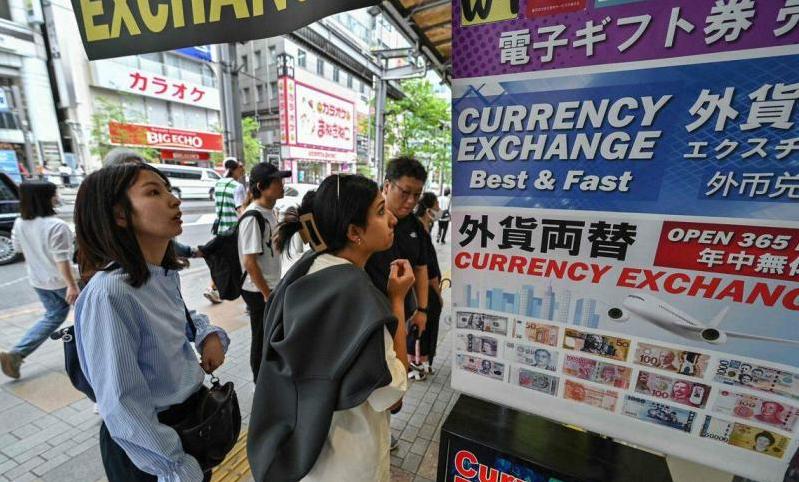
The exchange rate of the Japanese yen fluctuated wildly on Monday, rapidly depreciating to more than 160 yen per dollar, a 34-year low since April 1990. After that, the yen surged, reaching 154.5 yen at one point. The yen also suddenly rebounded against the Singapore dollar, from an earlier level of Y117 to about Y114.6.
Tokyo market related people pointed out that the Japanese government and the central bank may intervene in the currency market. Japanese Finance Ministry official Masatsu Kanda said in an interview Monday that he had "no comment" on whether to intervene in the currency market, and stressed that "we cannot ignore the adverse impact of the (yen exchange rate) volatility on the national economy," Kyodo reported.
The Bank of Japan decided to maintain the current easing policy at its monetary policy meeting on Friday (26th). Overseas markets are predicting that Japan will not raise interest rates further in the near future. On the other hand, the view that the U.S. Federal Reserve will delay the start of interest rate cuts because of inflation pressure is still high has strengthened.
On Monday morning Japan time, sales of the yen accelerated, reaching more than 160 yen to the dollar. In the afternoon, the momentum changed and the market shifted to buying the yen, trading at around 155.55 yen per dollar at 5 p.m.
The Japanese yen continues to depreciate
The continuous depreciation of the yen can attract foreign tourists to Japan to spend money, but the fall of the yen is tying the pace of Japanese people to travel abroad.
According to the Japan National Tourism Agency, interest in outbound travel is well below pre-coronavirus levels due to a weaker yen, high airfares and weak wage growth. In March, Japanese made 1.22 million trips abroad, 36.8% less than the same period in 2019. Traditionally, large numbers of Japanese have gone abroad for the Golden Week holidays in late April and early May, but this year 520,000 outbound trips were made during the holiday, just 2 percent of domestic trips, according to JTB, a major travel company.
Lianhe Zaobao interviewed in the financial district of Otemachi, a Japanese female office worker complained to reporters. She said: "Before the epidemic, the yen was high, and I traveled abroad with friends almost every Golden week. Now, the yen has depreciated so much that traveling abroad has become a luxury in my circle."
A man in his 40s with a family said, "Every time my family of four goes abroad, it costs me several months of monthly salary. I think I'll have to wait until the yen appreciates a bit before I have a chance to go abroad." Many respondents said the weak yen made vacations in Japan cheaper.
Old Japanese hotels, which were teetering during the coronavirus pandemic, have been doing brisk business as Japanese choose to travel domestically. At the Ito-ku Onsen Inn, a two-hour drive from Tokyo, a one-night stay including breakfast and dinner costs 15,000 yen (about S $130) per person; By comparison, a hotel in Hawaii in the United States costs an average of US $375 (S $510) a night.
An employee of Kinki, a major travel agency in Japan, said, People who used to travel abroad have turned to domestic travel, and many are opting for luxury facilities such as hot spring pools and spas. In addition, Japan also has some seemingly foreign areas, such as an English villa in Fukushima, which has a resemblance to a Thai shopping street. There are a lot of new hotels opening in Japan, so it's important to take advantage of this domestic tourism."
Some analysts say that the Japanese are likely to become the bottom of the well in the long run if they do not go abroad due to the depreciation of the yen. Some in the airline industry say the yen is better off at 130 yen to the dollar so that Japanese don't find it difficult to travel abroad.

報告顯示,中國電力投資加速增長,預計2024年電網基建投資將超過5300億元。
近日,市場迎來了一則引人注目的消息:工業巨頭3M公司(MMM.N)在本周五公布了其季度業績報告,隨後股價飆升至近兩年來的
最近,外媒給OpenAI算了筆賬,今年可能要血虧50億美元。
近日,巴黎奧運會和世界鐵人三項協會聯合發布了一項重大決定,宣布因塞納河水質污染問題,原定於近期進行的奧運會鐵人三項首次下
當地時間7月18日,法國巴黎發生了一起令人震驚的持刀襲警事件。
近期,一則重大消息在國際舞臺上引起軒然大波,馬來西亞宣布加入金磚國家。
調查發現,互聯網和智能手機的使用幹擾了韓國近五分之一學生的生活。